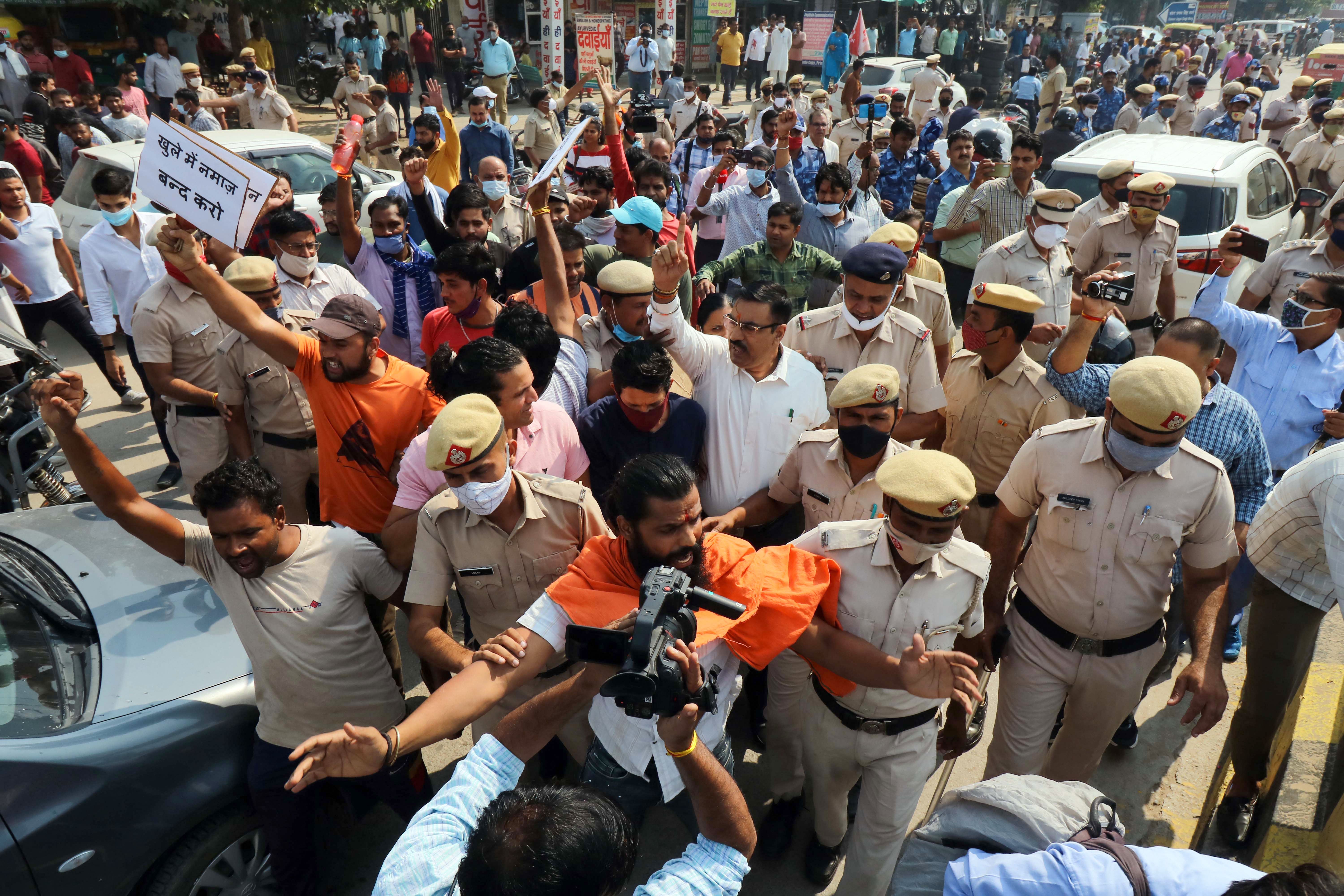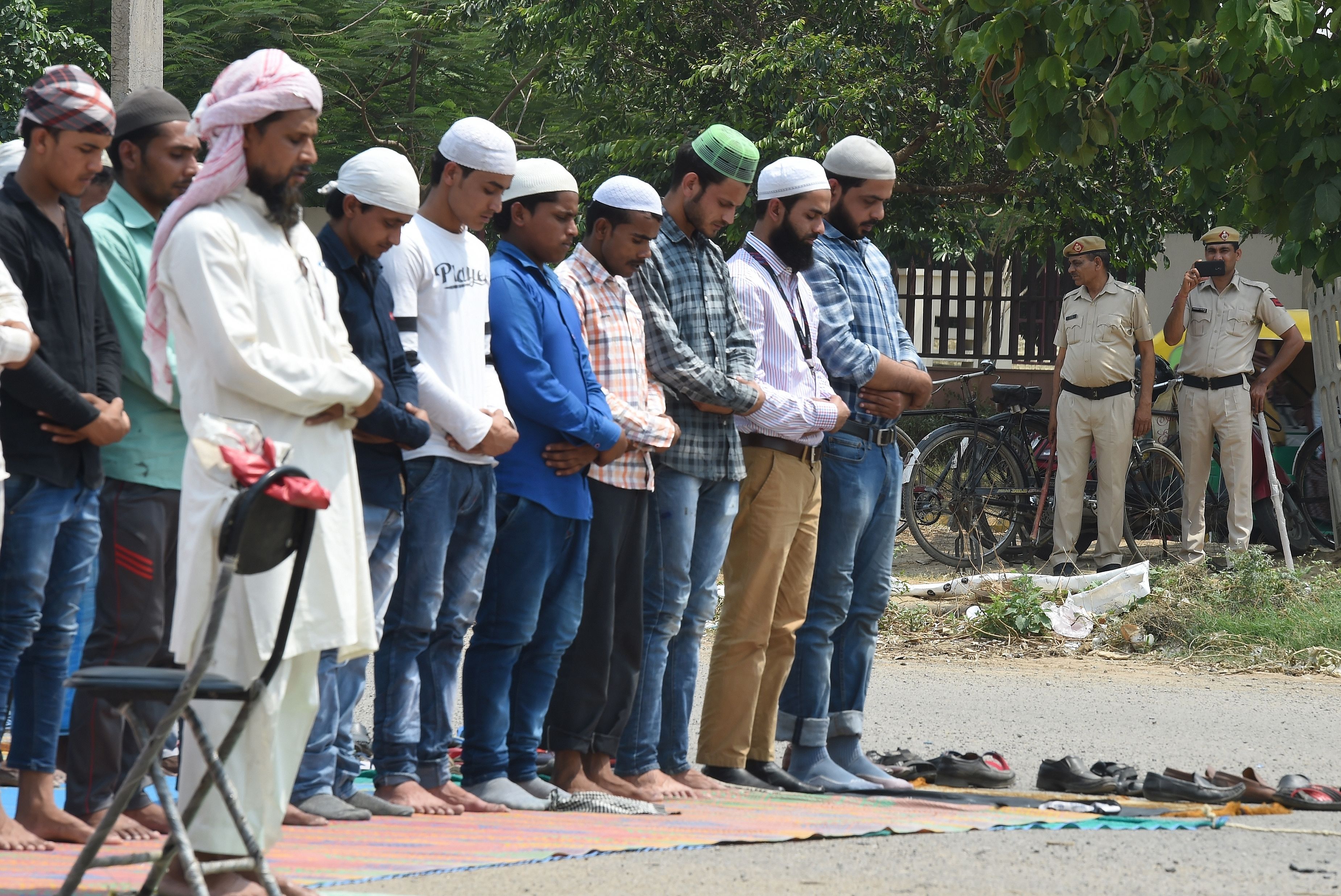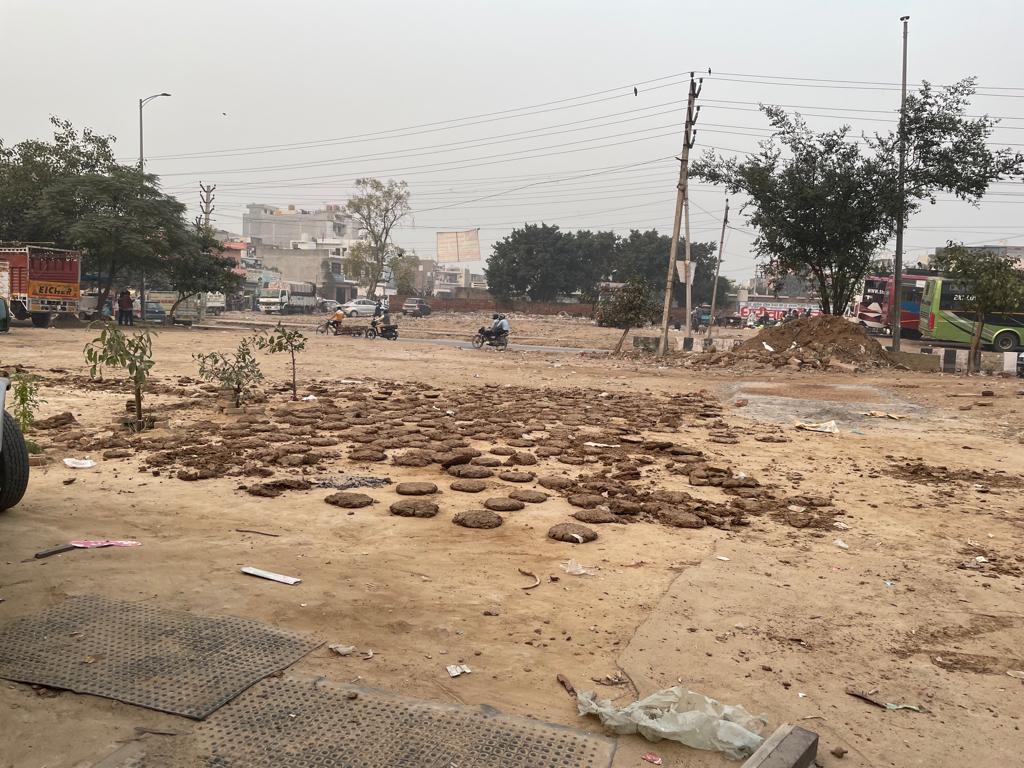In Delhi’s booming cyber city, space for Muslims to pray is shrinking
Each Friday for the past two months, Muslims in this satellite city of the Indian capital have faced an anxious search for places to pray where they won’t be hounded by right-wing Hindu groups. Sravasti Dasgupta reports from Gurugram

For the past two and a half years, Nadeem and his colleagues at a car repair shop in the Delhi satellite city of Gurugram have been offering Friday prayers at an empty plot of land, barely 500m away from their place of work.
With only 21 mosques catering to the entire, rapidly developing city of more than 1.5 million people, many working Muslims like Nadeem have had no choice but to congregate for midday Friday prayers at impromptu sites such as car parks and disused patches of grassland. The practice proved controversial among residents and right-wing Hindu organisations in particular, and in 2018 the authorities restricted these prayers to just 37 designated open-air locations across Gurugram.
Yet now those spots are also under threat, and at the end of October the plot used by Nadeem and his colleagues became the latest site to be targeted for a protest by members of right-wing groups.
“They came in a large group, chanted slogans, abused us and disrupted our prayers,” Nadeem tells The Independent. Rather than protecting the site, two days later police came to Nadeem and his colleagues and told them they could no longer use it to pray.
It’s a pattern that has played out across Gurugram, with the district administration and the police giving in to pressure from a number of right-wing groups, many of which are affiliated to India’s ruling Hindu nationalist Bharatiya Janata Party (BJP) and its parent organisation, the Rashtriya Swayamsevak Sangh (RSS).
Since the latest pressure campaign began on 17 September, Friday prayers have been disrupted at one of the 37 sites after another, with Hindu groups calling the open-air namaz (prayer) a misuse of public space and alleging that these congregations are a threat to security. On 2 November, the district administration permanently withdrew permission for prayers at eight of the 37 designated sites, and with protests continuing there is no guarantee that the space for Muslim prayer in Gurugram will not shrink even further.
Dr Amir Ali, a political scientist at Jawaharlal Nehru University in Delhi, sees what’s happening as another attempt by right-wing Hindu organisations to “keep finding fault lines to open up” between communities. “It is only the latest in a pattern of creating rancour with respect to the Muslim presence in India. The opposition to namaz represents a further attempt to cleanse and purify public spaces of any form of Muslim religious and cultural observance.”
Gurugram, formerly known as Gurgaon, saw unprecedented growth in the 1990s, when liberalisation made it a corporate hub and attracted migrants from across the country for both high and low skilled jobs. A number of global tech giants now have their India headquarters here, including Google in the glittering Signature Towers development.
But this rapid development did not factor in Muslim prayer spaces as a priority, and the fact that mosques are so few and far between makes it difficult for many Muslims to reach them in the middle of a working day.
“Most of the mosques are at least 5 to 6 km away from areas where we work,” says market worker Sharib. “We get only about an hour as lunch break. It is difficult to travel that distance, go for jumma (Friday prayers) and have lunch in this small window. Which is why we prayed at these designated sites.”
“Unlike established cities there are hardly any mosques here. People are forced to pray in public as town planning did not include mosques. Look at New Gurugram: there is only one mosque, [which can accommodate] 300 people,” says Altaf Ahmad, co-founder of the Gurugram Muslim Council and a member of the civil society group, Gurugram Nagrik Ekta Manch.
The organisation says that Waqf land, which has been bought by wealthy Muslims and donated for the community’s use, has been encroached upon for years for other purposes.
Jamaluddin, the estate officer for Gurugram from the Haryana Waqf Board, which manages such land across the whole state, acknowledges the problems with space in the city but says they can only be resolved by the local administration.
“The district administration has to ensure that the designated spots for jumma namaz are allowed to remain so, or the government should allot new land for the purpose,” he says.

Friday prayers have been offered in Gurugram’s public spaces for more than a decade and, even considering the disruptions in 2018, the large-scale opposition to namaz in the past two months is unprecedented, say observers.
“What’s different this time is the complicity of the administration. In 2018, I was part of the negotiations and there was a willingness on the part of the police to rein in these goondas [thugs],” says Apoorvanand, who teaches at Delhi University.
“But this time we see the police asking the same people whether they are happy with how things are progressing, with police limiting namaz sites. It is not so much about political complicity in my opinion, even though many of these groups are affiliated to the BJP-RSS. This is more of giving them a sense of impunity.”
Last Friday, the right-wing groups shifted the focus of their attention to Sector 37, where a small crowd had gathered for Friday prayers. Videos shared widely on social media showed the protesters issuing threats and disrupting prayers, while police do little to stop them.
Later, reports said that seven people had been detained.
For Muslims working in the area, anxiously looking for a safe place to offer Friday prayers, it’s the same drill playing out every week.
Taufiq Ahmad, who owns a shop in Gurugram and has been at the forefront of taking workers’ concerns to the authorities, says the issue is not a case of public inconvenience or safety.
“If people are having problems, we don’t want to inconvenience them. We moved out of the sites they raised objections to. But then why did they do the Govardhan puja [a Hindu prayer ritual] at the same site after stopping us from praying in public?” he asks.
He’s referring to the fact that the disruptions to designated namaz sites have repeatedly included Hindu groups holding their own prayer meets in public. For instance, at a site in Sector 12 last month where namaz had been disrupted, a Hindu prayer meet was held where the prominent BJP politician Kapil Mishra is accused of speaking out against Muslims.
On a visit to the disputed Sector 12 site, The Independent saw that the ground has been covered with cow dung cakes, considered holy by Hindus.

Rahul Khan, who owns a furniture shop on a corner of the site, says that namaz is no longer being offered at the site, but members of Hindu groups visit every Friday and sit in a corner to ensure no one dares to come and pray.
“The concern is not one of misusing public land. The issue instead is about creating Hindu supremacy and telling Muslims what they can and cannot do,” says Apoorvanand.
One of the leaders of the Hindu groups is Dinesh Bharti, founder of the Bharat Mata Vahini, an organisation he claims he set up “to protect Sanatan Dharma” or the eternal order of Hinduism.
Speaking to The Independent, Bharti, who also says he is a member of the BJP, said that he led the anti-namaz protests in 2018 and is doing so again.
“I have made it my mission to find this list of the so-called designated 37 places. I want to know who has given them permission to do namaz in public,” he says.
“No one can do namaz in public. Muslims congregate through namaz, they collect money; this is how they increase their population. Namaz is a show of strength for Muslims. In Kashmir for example, fatwas were issued from mosques asking people to drive Hindus out of their homes.
“If they continue to occupy public space like this will we break our country into pieces and give it away? Muslims may be here for the past 800 years, but Hindus have been here since God created mankind,” he says.
Bharti, who has gone to jail several times over these protests, says he works with local residents’ welfare associations (RWAs) to oppose namaz on the basis of public safety.
And on this point he appears to have found willing allies. “Women and children are home alone on Fridays. These people come and pray in our parks, which creates safety issues. There have been several robberies on Fridays, which is why we approached the administration and asked them to end namaz here,” says Sunil Yadav, president of the RWA for Sector 47.
Muslim civil society groups have accused Bharti and his affiliates of spreading communal disharmony, a criminal offence in India, and on 1 December a police complaint was lodged against him and two others.
The next day, Bharti told The Independent he had given his own written complaint to the district administration, as well as Haryana’s BJP chief minister, Manohar Lal Khattar, demanding an end to “public namaz” in the interest of public safety.
District Commissioner Yash Garg told The Independent he cannot issue a full statement “since the situation is under flux”, but that “efforts are underway to reach a consensus between the two communities”.
The Independent has also approached the Gurugram commissioner of police, KK Rao, for comment.
Muslims say that if the administration is unwilling to act against the groups disrupting prayers, they can at least allocate land for new mosques or prayer sites that will not force people to pray in public.
“We had applied for land in 2017 but there was no allotment,” says Ahmad from the Gurugram Muslim Council.
“We met the administration in November and asked again. They won’t allot land, they won’t build mosques, they won’t let us pray in public. What can we do?”
Though Haryana itself doesn’t go to the polls again until 2024, the namaz issue has become a political one with several neighbouring northern Indian states holding important elections in the coming few months.
Analysts say that while the issue could be resolved amicably by allotting some more land for prayers, the government is unlikely to pursue that option, so there is no simple solution to the issue in sight.
“Governments certainly need to do more, but they are unlikely to do so as any concession offered to Muslims is likely to be labelled as ‘appeasement politics’,” says Dr Ali. “This means that even governments formed by parties other than the BJP will refrain from trying to resolve the issue. They would not want to be seen as being overly accommodative of Muslim demands.”






Join our commenting forum
Join thought-provoking conversations, follow other Independent readers and see their replies
Comments